Featured Brands
Recommended Products
Get free shipping, on most items, with your $50 purchase today! Same day shipping on most orders if placed by 3pm PST.
PLEASE NOTE:
This offer is only available to physical shipping addresses in the 48 continental United States (no PO Boxes), and some exclusions apply.
Oversize Charges
Some large and/or heavy items are subject to additional oversize charges that are separate from standard shipping costs.
Bike Build Process
All bikes are built, tested, tuned, and ready to ride upon shipment. The bike build process typically takes 2-3 days to complete depending on the bike model and the complexity of the build.
Stock Status
Orders for in-stock items placed by 3PM PST usually ship on the same day. Orders that include special-order or backordered items may be subject to shipping delays depending on product availability. Refer to estimated delivery times in cart when selecting shipping options.

Our Gear Advisors are Ready to Help.

It used to be that the only options for composite flats were just cheap commuter pedals with next to no grip, terrible shape and feel, and prone to shattering if you even passed a nearby rock. You could find some BMX pedals that were better, but the grip and size still weren’t ideal for the demands of mountain bike riders. Luckily, brands like Deity, Race Face, One Up, and others have completely changed the face of that market with strong, fairly light, large-platformed, and affordable composite pedals. Over the years, Deity has been cranking out some of the best flat pedals for years and their latest nylon composite pedal, the Deftrap, continues that stellar legacy, and then some. A few of us, at Jenson USA, have had the opportunity to put these pedals to the test. Read on to see our full ride review and pedal details.
DEITY HERITAGE | DEFTRAP VS T-MAC DETAILS | THE COMPETITION | RIDE REVIEW | MY RECOMMENDATION
Deity’s line of flat pedals has always embodied the core personality of the brand and perhaps no pedal has done a better job of this than their TMAC signature series pedal. Designed to meet the needs of Tyler McCaul’s hard-charging freeriding, the TMAC pedals are arguably one of the most impressive pedals available in the bike world and the reviews from customers, bike industry folk, and pro riders are a true testament to their top-tier performance and stunning looks. These pedals have amazing grip, a large and comfortable platform, a truly deep 2.5mm of concave shaping, and come in an array of beautiful colors and precision aluminum machining. All this quality, durability, and refinement does come with a somewhat hefty price tag. You might be asking, why I’m talking about the TMAC pedals if this review is about the new Deftrap pedals? Well, the TMACs set the bar and were the jumping off point when it came time to develop the Deftrap. So, let’s dig in.
As you can tell, I’m a big fan of the TMAC pedals and think they are a perfect fit for my rides on freeride and DH-oriented bikes. But, like many of you, I find myself struggling to convince my wallet to open wide enough to put the TMAC pedals on most of my bikes. It’s not that the TMACs aren’t worth their price. In fact, with that price comes some of the best-in-class grip, comfort, platform size, control, and durability. But, these days, a majority of my miles are on my trail or enduro-light bikes that see a bit less abuse and where weight still kind of matters. So, for the last several years, I’ve opted to match those bikes with the new crop of quality nylon composite pedals due to their balance of performance and stellar price, plus they tend to be just a bit lighter.
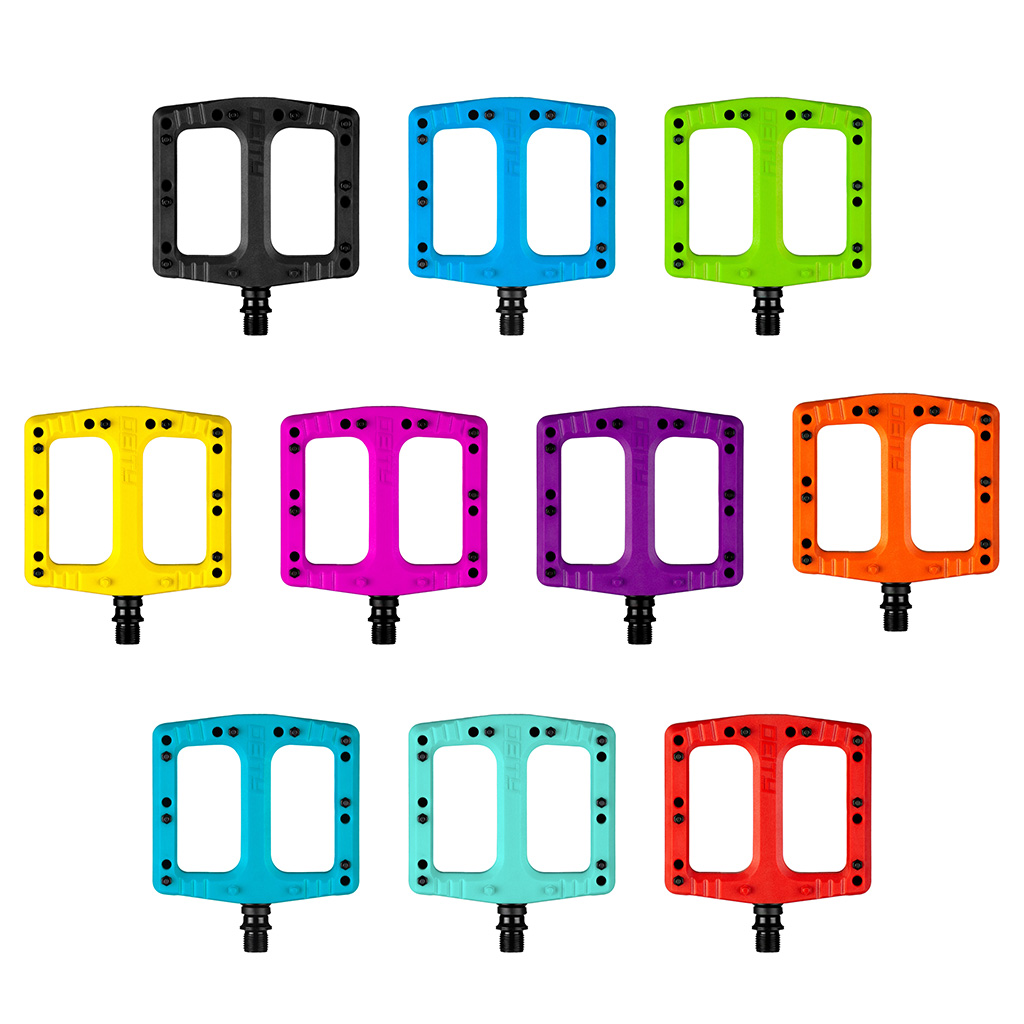
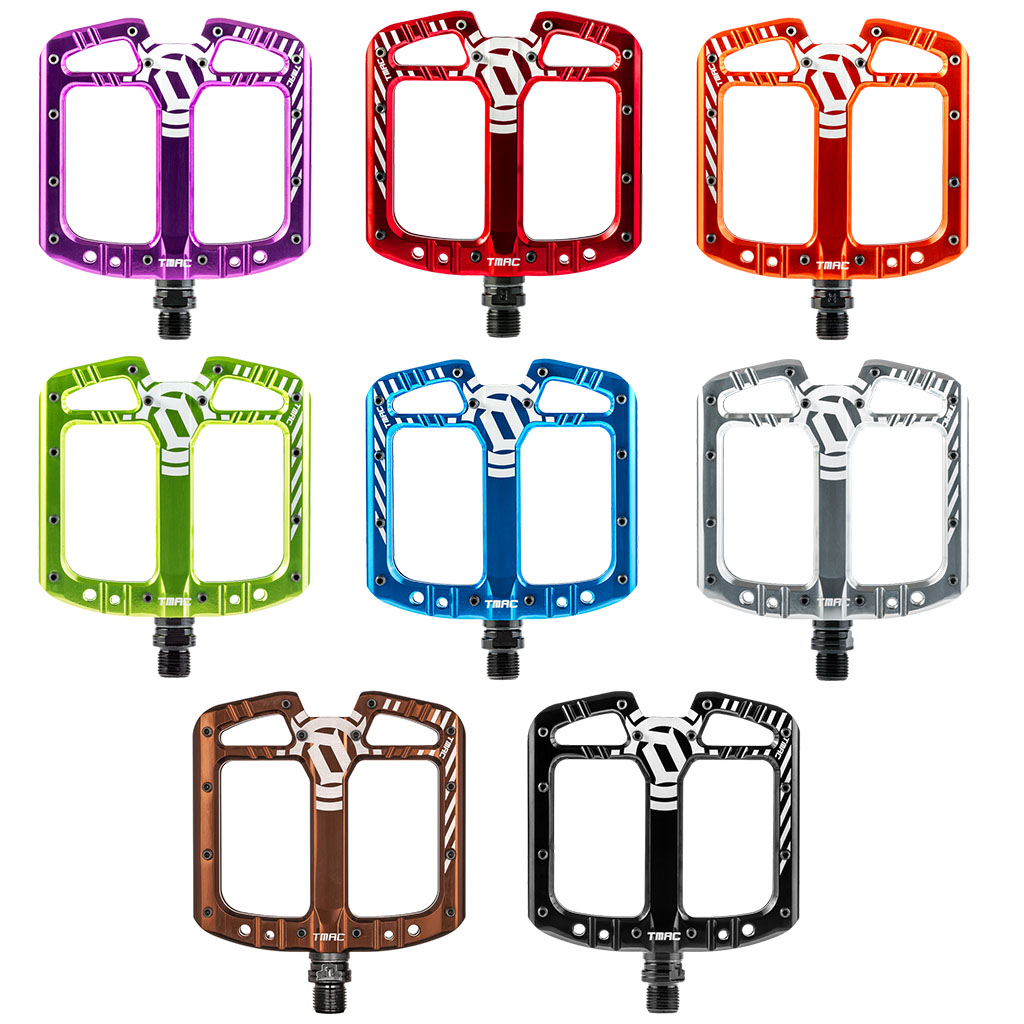
My first foray in riding composite pedals started off riding the Race Face Chesters. While these performed rather well, the size and shape of their concave platform wasn’t my cup of tea. To try something new I switched to One Up’s Composite Pedal that have a slightly larger but thinner platform than the Chesters, longer pins and a convex shape. A concave versus convex platform shape is entirely a personal preference, that you will want to determine for yourself. For me, I found that I liked how the convex shape wrapped my toes a tiny bit, which felt like I was scooping the pedal more on jumps and during efficient pedaling. This wrapping seemed a better fit for my bikes that see a lot of pedaling versus my more gravity-oriented bikes.
I’ve been very satisfied with my One Up pedals, so when Deity sent me their new Deftrap pedals for testing, I knew there would be a pretty high bar they’d need to beat for me to want to swap out my current pedals. My previous experience with concave pedals left me a bit hesitant that I would like that shape as much, or better, than what I had gotten so comfortable on.
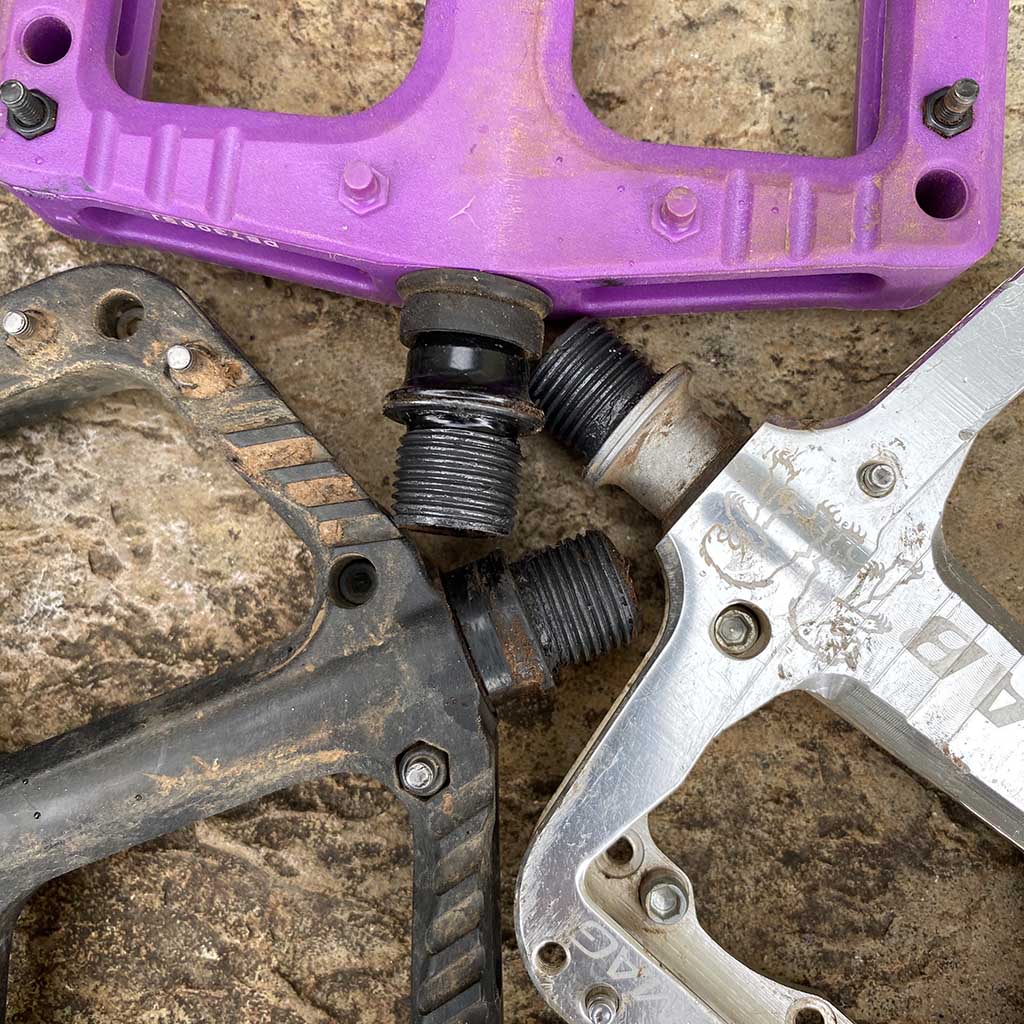
On paper, the Deftrap pedals look impressive, but there are a few details where the One Up’s specs appear to edge them out. The One Ups weigh about 30g less, are a touch thinner, and have a slightly larger platform. These are pretty small differences, so I wondered if I would even notice while out for a ride. The shaping of the One Up pedals is more of a hexagonal shape with chamfered edges versus the nearly square shape of the Deftraps (more on that later).
During testing, I also had a pair of Chromag Scarab pedals laying around from a buddy’s bike. I’ve spent very little time on these, but thought I’d throw them in the mix to compare specs. The Scarab pedals are another customer favorite. The aluminum platform size is within a few millimeters in either direction of the Deftraps, weight is ~430g, and the have a concave shape that is 13mm thin at the axle. The Scarabs have some cool features involving the pins. First, you can set the pins at 2 different heights by removing a washer. There are also 40 different placement options per pedal for those pins to customize the feel and grip, and the pins have a shear line, so if you smack a rock the pins won’t damage the pedal and are easily replaced.
| Material |
Premium Nylon Composite |
Nylon Composite |
Nylon Composite |
Aluminum |
Aluminum |
| Platform Size |
103x113mm |
115x105mm |
101 x 110mm |
108x110mm |
105 x 110mm |
| Profile |
1.5mm Concave |
2.5mm Convex |
Concave (Depth TBD) |
Concave (Depth TBD) |
2.5mm Concave |
| Pins/Side |
8 Steel / 2 Molded |
10 Steel |
8 Steel |
10 Steel 2 Position w/Sheer Line |
14 Steel |
| Axle |
Chromoly Steel |
Chromoly Steel |
Chromoly Steel |
Chromoly Steel |
Chromoly Steel |
| Bearings/Bushings |
2 Sealed Bearings with Oversized DU Bushing |
DU Plus Cartridge Bearing |
Sealed Bearings and DU Bushing |
Sealed Bearings and DU Bushing |
Multi Micro Sealed Bearings and Deity DU Bushing |
| Color Options |
10 Colors |
4 Colors |
11 Colors |
7 Colors |
8 Colors |
| Weight |
391g/pair |
360g/pair |
360g/pair |
430g/pair |
409g/pair |
| Price (MSRP) |
$49.99 |
$49.00 |
$49.99 |
$148.00 |
$168.99 |

Now, that we’ve looked at how these compare on paper to some of their closest competition let’s get to the dirt of how they feel out on the trail. In short, the Deftraps were damn impressive! These pedals have grip in spades, the concavity was very comfortable, and there seemed to be so much platform area to support your foot. Their grip landed somewhere between the TMACs and One Up's Composite Pedals. This is likely due to having less concavity and fewer pins than the TMACs. While not as light nor as slim (or light) as some of the other competitors, I didn’t feel too tall over my axles. Instead, the concave shape and longer profile made it feel more “in the pedal” than on the thinner competitors. I did find that it did take a bit more footwork to shift my position on the pedals if I had planted my foot in the wrong spot when compared to the One Ups. Since they have the same number of pins, I attribute this to the concave versus convex shape of the two pedals. Some riders will prefer the more planted feel of the Deftraps, while others might like the slightly more free feel of the One Ups.
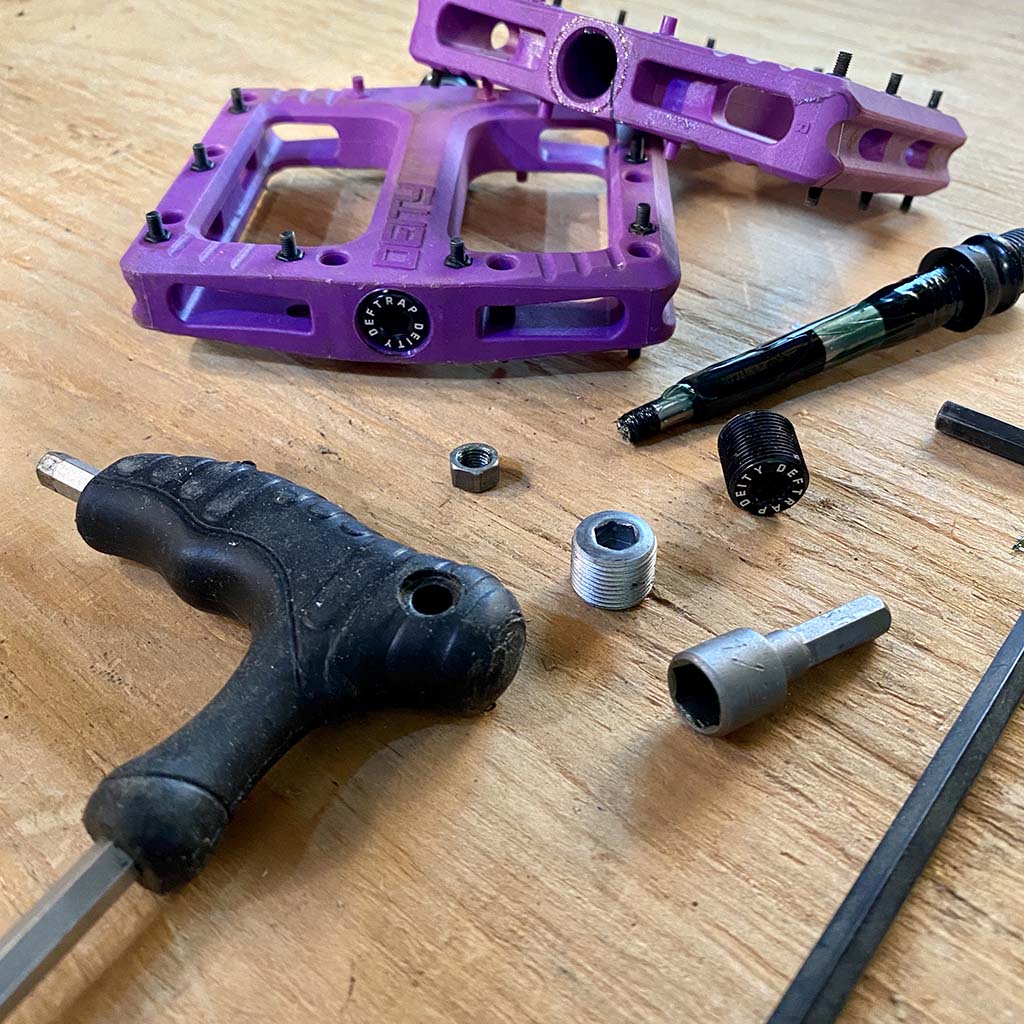
Deity claims that the premium nylon composite material they use is 28% stronger than the competition. I couldn’t come up with a clever way to test that claim but I did attempt to send some bigger jump lines and takes some silly lines to see if I could get the pedals to flinch. Despite my best efforts, they felt plenty solid and secure throughout my rides thanks to the strong nylon composite matched to chromoly axles and robust shape.
There was initially a bit of drag that you could feel when spinning the pedals in hand, but it was not noticeable on the trail and they seem to be breaking in nicely. I also had a bit of grease weep out from the inboard seals. After tearing the pedals down, it appears this was just a bit of excess since there is still plenty of grease to keep things running smoothly and they no longer weep. Speaking of seals, Deity did a fantastic job ensure that these will keep your bearings/bushings happy even in sloppy conditions and the design of the pedals look like they would shed mud easily. The simple tear down revealed 2 sealed outboard caps matched to the inboard seals to ensure dirt and moisture stay where they belong; outside.
All the pedals I’ve mentioned are fantastic options, but there is something a bit extra special about how at-home my feet felt from my very first ride on the Deftraps. I’ve been analyzing the numbers and comparing pedals side-by-side to try to figure out why these feel so good underfoot. Honestly, I couldn’t figure it out until I shot a few photos of the pedals stacked on top of each other. It was only then, that I could see why Deity’s non-offset profile was what their test riders liked best. Most of the other pedals had some sort chamfered edges to help the pedals slide over trail obstacles during a pedal strike. Theoretically, that makes sense, but I’m not sure I’ve ever noticed that in the real-world. What I did notice was just how much larger the Deftraps felt underfoot despite having very similar platform sizes. In looking at the stack of pedals it seems that the usable real estate is bigger due to the boxy shape. All I know is that this was the one marketing point that I was certain wouldn’t matter, but found to be the most impressive instead.
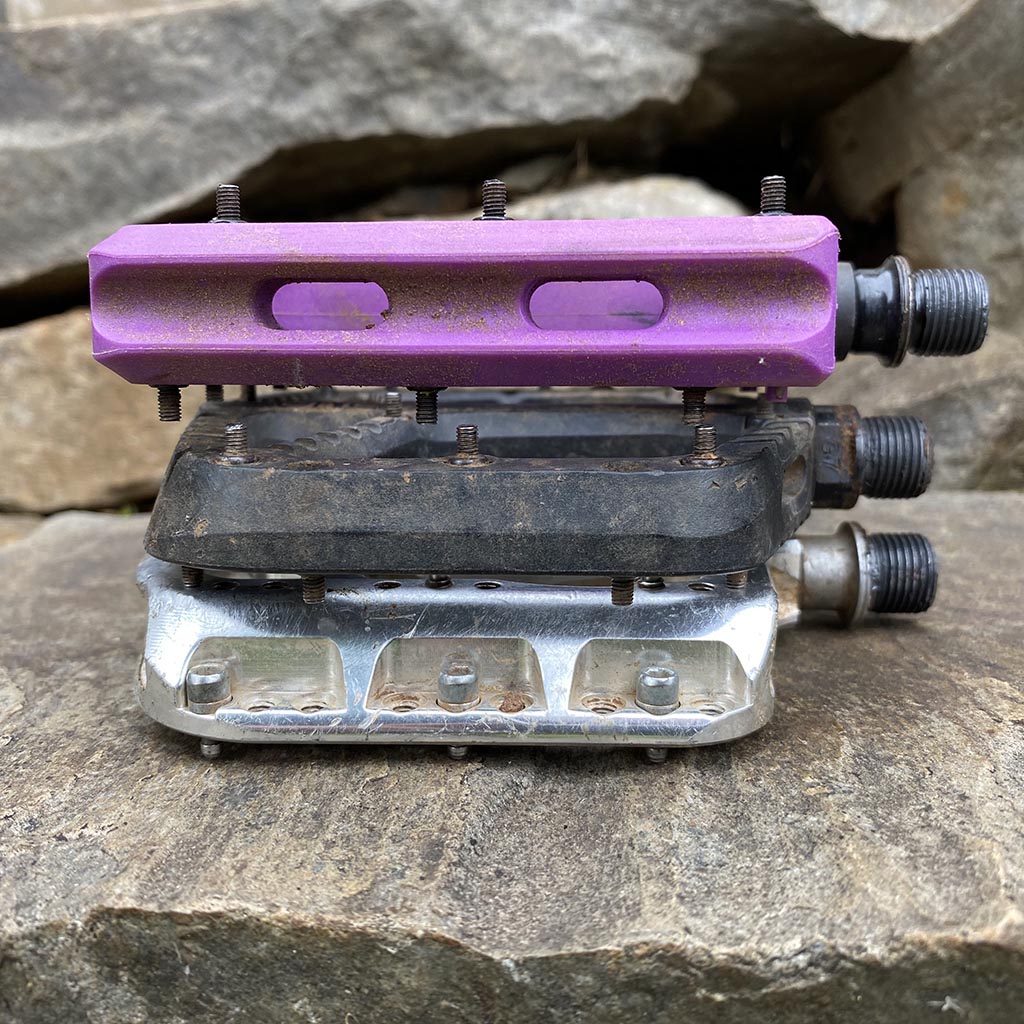
Obviously, I love the Deftraps, so these are a definite buy if you are looking for a new set of platform pedals. The bigger question is, "are the Deftrap pedals good enough to upgrade my current flat pedals?" Yes… mostly. I’m not tossing my collection of One Up pedals just yet but I will be picking up a fresh set of Deftraps to match my new enduro bike and Deity Lockjaw grips (one of my favorite grips ever!!!). On the other hand, my wife has decided to officially become a mountain biker (yes!!!) and I will be using the One Ups on her trail bike while she learns about riding on flat pedals due to their easier ability to adjust foot position. I’ve also been debating back and forth on which pedals to put on my pump track bike, but I think the winner is Deftraps with the pins threaded back about halfway down. Lastly, if I ever own a DH bike again, I will stick with the TMACs for their robust build, stunning colors, and insane levels of grip.
Pros
Cons

I would recommend these to a wide spectrum of riders. Basically, anyone looking for an affordable and durable pedal with tons of grip and a concave shape should put these on their shortlist. Also, if you find that your rides are filled with your share of pedal strikes, the nylon composite will deflect easier than aluminum and still look good after. For those looking for ultimate grip or hitting hard-charging freeride/DH lines, the TMACs are a better option thanks to their added strength and increased concavity.
SHOP NOW
SHIP ALMOST ANYTHING & SAVE
SHOP NOW
SHOP NOW
SHOP NOW
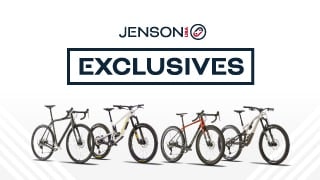



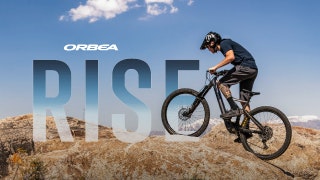
Follow Jensonusa